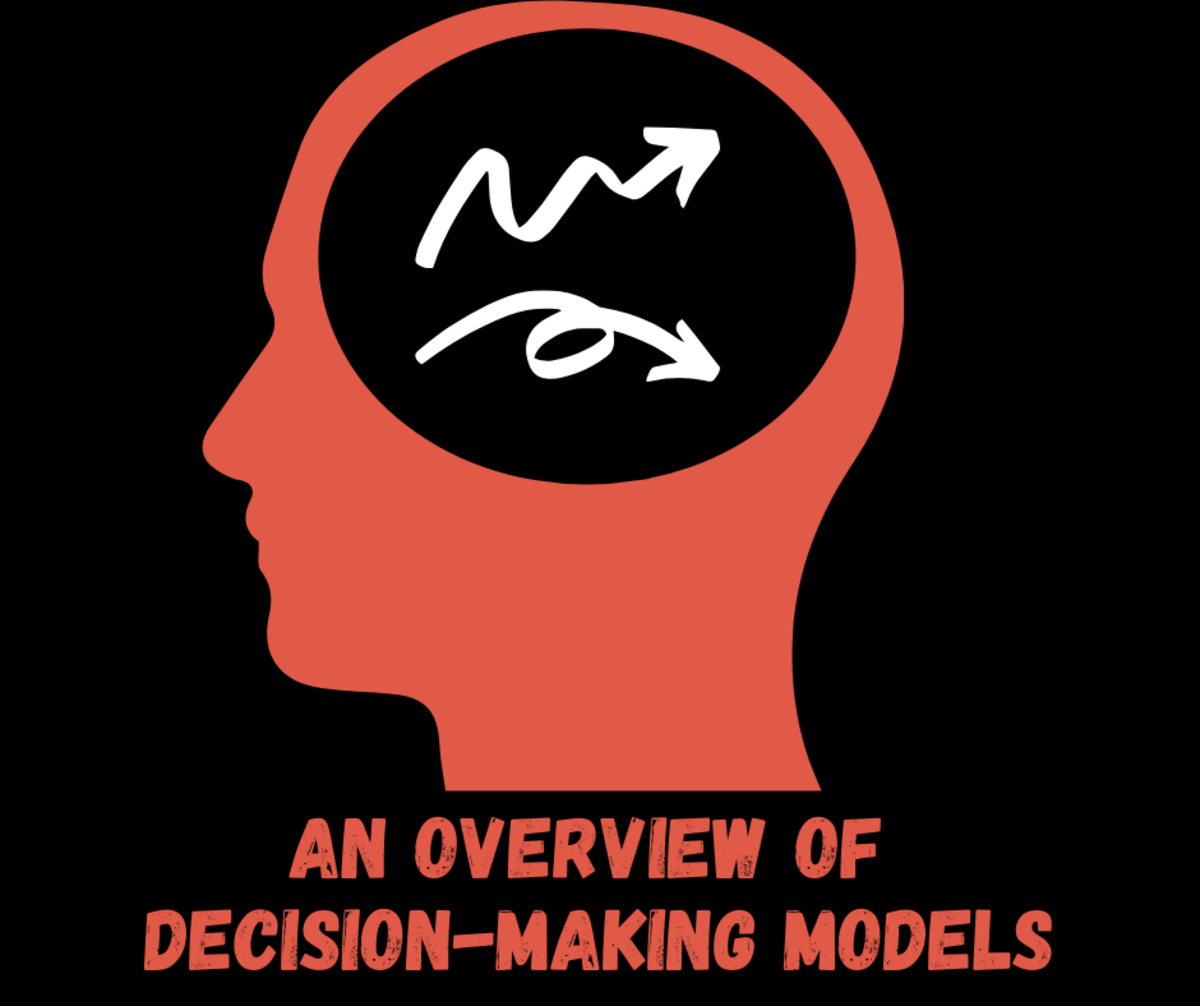- HubPages»
- Health»
- Mental Health»
- Emotions
Making Difficult Decisions

Everyone, at one time or another, is faced with having to make a big, potentially life-altering decision.There is no doubt that the mere thought of making such decisions can be frightening, intimidating, overwhelming, and stressful, sometimes to the point of being nerve wracking.
This article looks at a variety of ways to connect you, realistically, with your alternatives. It offers activities and suggestions that might help you become more aware and in touch with your inner voice in order discover more about what you really think, and how you really feel about possible alternatives as you struggle to make any big, difficult decision.
Life-Changing Decisions Are Never Easy ...
Often, what it comes down to is that you're faced with choosing between two entirely different alternatives:
- One of your alternatives is enticing because it will allow your life to maintain your status quo. It represents a chance to keep doing, pretty much, what you’re already doing. It is a certain path that you can live with, and you know it, because you’ve lived on a similar path for the past oh-so-many years.
- The other alternative(s) would lead you to uncertain places, places representing a big, scary, gigantic change in your status quo. Uncertain places are the unknown, but, these alternatives are options that could possibly make you happier than you’ve ever been in your life. The problem is, you have no way of knowing for sure that happiness will be the end result, or even if these alternatives are right for you. And that's what makes what you're faced with a big, difficult decision.

Four Considerations for Thoughtful Decision Making
The only guarantee in life is that life offers no guarantees. Let's face it: Sometimes you will make decisions that will end up not being the best ones for you. That's a fact of life. But, even though life does not come with guarantees, when it comes to making big decisions, there are certainly steps you can take to give yourself a chance to make sound decisions you can live with. What follows are four considerations that, if you heed them, will likely lead to alert, calm, purposeful, and well-focused thinking that can help you release at least some of the anxiety that can come along with having to make big decisions.
1. Listen to your inner voice. What is it trying to tell you? Are you acting hastily in making your decision? Do you need to devote more time to considering your alternatives? Perhaps you need to consult a friend or a loved one, or someone you know and trust, who may have been faced with making a similar decision in the past.
Whenever a big decision is looming overhead, it is possible to get so stressed out and scared, that even though you know your inner voice is still there, sometimes it might be difficult to hear it, or to focus in on exactly what it is trying to tell you. But rest assured that your inner voice is always there to be your best friend and personal adviser. Go to a quiet place where you can think, and then listen to what it is trying to say to you. Pay close attention as it tries to help you face many of the realities you need to face when you are trying to make any major decision. Of course, no one will fault you for doing your best to mitigate risks as much as possible; as you do the work you need to do prior to making a major life decision.

2. Consider how each alternative aligns with your values, beliefs, and purpose. Any choice that is right for you will be aligned with these. Becoming more self-aware will help you, now and in the future, to know what choices are more likely to be best for your life, in the short and long term. Be sure you can, and will want to, live with the decision you make. Involve your heart as well as your mind. What is it telling you? If you find yourself needing to be “talked into” making a particular choice, it may not be the right decision for you. If no alternative you've considered feels “right” for you, give more thought to the situation. Perhaps a better alternative will emerge that you have not yet considered.
Think about how your each alternative might affect other parts of your life. Will the decision “sit well” and “fit well” with other people who are important to you? Remember, it is important to consider the effects your final decision will have on the lives of those you love. Still, the best decision will be one that is aligned with your values, beliefs, and purpose.

3. Use your mind’s eye to visualize what your life might look like once you’ve made your decision. When you imagine your life with each alternative, how does your decision “look” and “feel,” as part of your life? Do you feel relieved with your first alternative as your choice? Do you feel more relieved with another alternative as your final choice?
Look closely at the consequences or possible end results of each alternative. How will the consequences affect you and any loved ones whose lives might be affected by your decision? Examine each alternative from as many angles and perspectives as possible.
If, after going through the above steps you are still not sure, it could help to try a more "hands on" approach to decision-making. Write down each alternative on a strip of paper, then fold and place the strips inside a small container. Shake the container, then close your eyes, reach into the container, and select one of the folded strips. Open your eyes. Do you believe you’ve made the right choice? Will the alternative you selected make more sense for you and your loved ones? If not, then at least you know which alternative you can now discard. Repeat this exercise until you know you’ve made the right decision by selecting the choice that is best for you and your loved ones.

4. If you're a person of faith, pray, and then listen for God’s response. Pay close attention to your life and make sure you don’t miss out on the answers God is sending to you when you pray or when you ask for wisdom and guidance. Make sure, first, you’re asking out of a sincere desire to do God’s will. God always sends us answers, but sometimes we’re too busy living our lives, or we’re too consumed with the affairs and business of the secular world to look around, listen, and receive messages from God.
As a devoted Christian, I know that the goal of God’s wisdom is to move us closer to being more like our ultimate role model, Jesus Christ. People who seek and find God’s wisdom, through Jesus Christ, become wiser with every new piece of inspired understanding. The more we begin to resemble Christ in our ways and actions, the wiser we become. Proverbs 13:20 tells us: “He that walketh with wise men shall be wise: but a companion of fools shall be destroyed.”
God works through the people in our lives, and through people we meet. God can respond to your prayers through your “inner voice,“ or He can respond through situations and circumstances you’re involved in. He can send an inspired message to you through television ministers, or through any medium He selects. But in order to know you’re being given divine guidance, you must first know and trust God and Jesus Christ.

When It Comes to Difficult Decisions, There Are No Guarantees
Life does not come with guarantees, that's for sure. And, because it doesn't, you can be sure you won't always make the right decision. Still, making a decision feels better than indecision, and no matter what, you can always learn from the decisions you make. If, after making a decision, you discover it was not the right choice for you, learn from the choice you made, and then choose how you will react/respond to your current situation. Allow what you've learned to strengthen you, to help you make better decisions in the future.
You should always do your research, your due diligence, to discover as much information as you can about what it is you want to do. You should find and talk to people who are already doing what you want to, talk to people you trust, ask them for their advice as you start on the path to get to where they are now. Find out as much as you can, always, but the truth is, when it comes to making big decisions, it's likely that the greatest thing you have to fear really is fear itself.

Final Thoughts on Making Big Decisions
Chances are there will never be a time in your life that is perfect, where all the planets align and your moon is in the seventh house. There will never be time when you can be one-hundred percent assured, without a shadow of doubt, that you will indeed be able to keep all the pieces of your life together and running smoothly after making a big and difficult decision. What is a possible "worst case" scenario? One is that, after making life-altering decisions, you discover that you made the wrong choice, and having made that choice could destroy (or at least postpone) your chances of making one or more of your more immediate goals a reality. If that happens, you'll have more decisions to make. One of them will be deciding what to do to make it easier to live with the wrong decision you made, at least temporarily. Another is deciding when to make yet other decisions so that you can move on from your mistake.
In the final analysis, learning to be optimistic and confident in yourself and your ability to make decisions is key to helping you calm your mind. And, as long as you are willing to put in the time it takes to consider the possible steps you’ll need to take, you should find some comfort in knowing you will always do your best to give decision-making your all. After deciding to give it your all, take a deep breath and a step back. Try to be as objective as possible as you do your research, and work hard to learn as much as you can about possible solutions and alternatives. Take inventory of your skills, interests, talents, education and/or knowledge. Use everything you have, and everything you know that might help you choose between alternatives and options. Doing this will help you replace negative thoughts, feelings and behavior with positive thoughts, feelings, and activities, and you'll be on your way to making a decision you can live with.
Perhaps after going through all four steps mentioned in this article, it would be a good time to take a grown-up "time out" to look at your problem, to think of it--no matter how big it is, as something that can definitely be solved to your complete and utter satisfaction. But wait. If you do that, you'd be engaging in the kind of thinking that fairy tales are made of, right? Now, think about it for a longer moment. Perhaps engaging in this type of fairy-tale thinking is actually a good thing to do, sometimes. Why? Because fairy tales are inspiring. They can encourage you to think beyond your immediate boundaries, beyond your mental and physical limitations, and they can help you believe that some form of positive, win-win endings, no matter how fanciful, are absolutely always possible.
© 2012 Sallie B Middlebrook PhD








